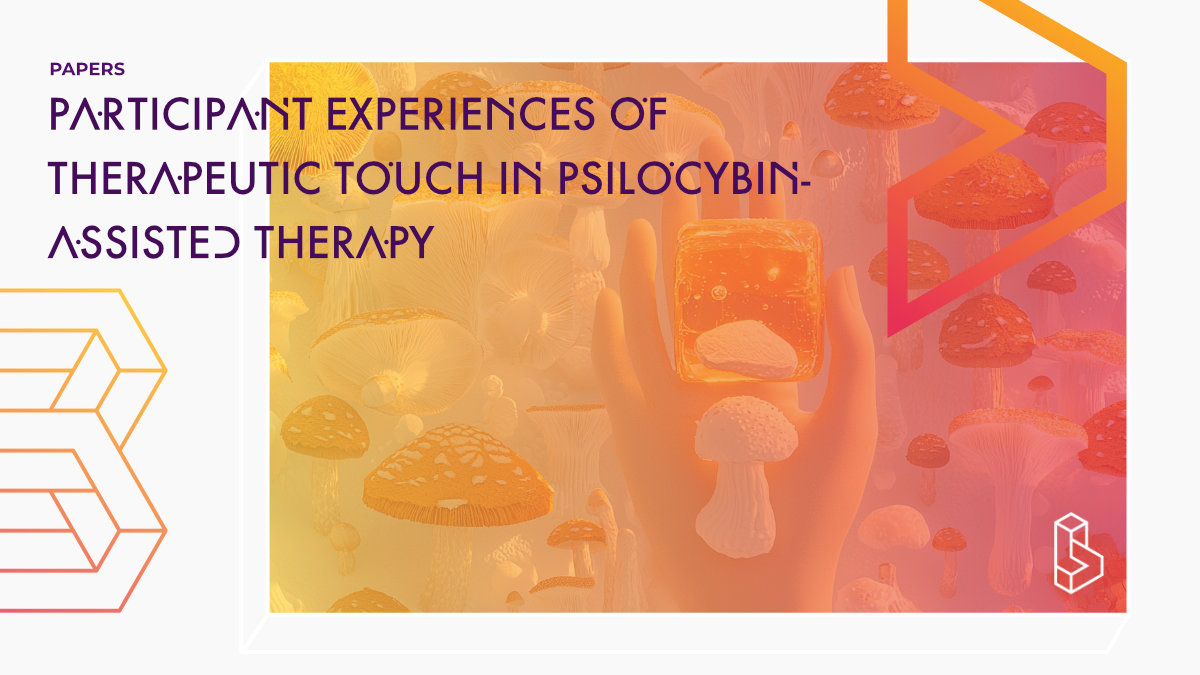This pre-print qualitative study (n=18) explores therapeutic touch in psychedelic-assisted therapy (PAT) for Generalised Anxiety Disorder (GAD). It finds that most participants valued touch during psilocybin dosing sessions, feeling it provided connection and helped manage intense emotional experiences, with some attributing therapeutic effects to it. The study emphasises the importance of a strong therapeutic relationship and recommends individualised use of touch, alongside further research on safety and therapist training.
Abstract of Participant experiences of therapeutic touch in psilocybin-assisted therapy
“This study explores therapeutic touch in psychedelic-assisted therapy (PAT) through the longitudinal perspectives of participants (n = 18) within a large clinical trial of psilocybin-assisted therapy for Generalised Anxiety Disorder. Qualitative and descriptive results show diverse preferences and responses to touch utilisation. Most participants valued touch, particularly after experiencing it first-hand within psilocybin dosing sessions. Participants felt that touch offered connection during intense emotional experiences and could be used strategically to manage the intensity of acute psychedelic experiences. Some attributed direct therapeutic effect to touch. A strong therapeutic relationship was essential for effective use of touch. While touch appears to be a useful clinical tool in PAT, we argue that its application should be individualized and embedded within a comprehensive consent process. Further research on safety and therapist training is needed to support the role of touch in PAT.“
Authors: Rachel Ham, Paul Liknaitzky, John Gardner & Adrian Carter
Summary of Participant experiences of therapeutic touch in psilocybin-assisted therapy
The introduction of the study outlines the increasing interest in therapeutic touch as a complementary practice in healthcare and wellness settings. Therapeutic touch is described as a non-invasive, energy-based approach that practitioners use to promote relaxation and healing. The authors note that while scientific validation of such practices remains debated, many individuals report significant subjective benefits from therapeutic touch interventions.
The researchers highlight the growing body of literature investigating touch-based therapies, linking them to psychological and physiological benefits, including stress reduction, emotional relief, and potential improvements in well-being. They emphasise the necessity of understanding participant experiences to bridge the gap between anecdotal reports and scientific validation. The study is positioned as an exploratory investigation aiming to capture the lived experiences of individuals who have engaged in therapeutic touch sessions, focusing on the themes that emerge from their narratives.
Methods
The authors employed a qualitative research design to capture rich, detailed accounts of participant experiences. A phenomenological approach was chosen to allow for an in-depth exploration of how individuals perceive and interpret therapeutic touch. The study recruited participants who had undergone at least one therapeutic touch session, ensuring a range of experiences was captured.
Find this paper
Participant experiences of therapeutic touch in psilocybin-assisted therapy
https://doi.org/10.31219/osf.io/ypqa2_v2
Open Access | Google Scholar | Backup | 🕊
Cite this paper (APA)
Ham, R., Gardner, J., Carter, A., & Liknaitzky, P. (2025). Participant experiences of therapeutic touch in psilocybin-assisted therapy.
Study details
Compounds studied
Psilocybin
Topics studied
Anxiety
Study characteristics
Qualitative
Participants
18
Humans
Linked Clinical Trial
Safety and efficacy of psilocybin-assisted psychotherapy for Generalised Anxiety Disorder [Psi-GAD-1]: a randomised triple-blind active-placebo-controlled trialIn this study, we will complete a randomised controlled trial to test a 7 week (2 dose) psilocybin-assisted psychotherapy for the treatment of GAD. 72 individuals will be randomly assigned to receive two doses either psilocybin (25mg or 30mg, oral) or placebo (diphenhydramine, 75mg or 100mg, oral) with three weeks between doses.

